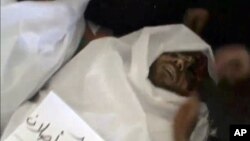A Syrian rights group says government troops have killed at least seven people in a second day of fighting with rebels in a previously calm coastal region where no U.N. observers have been deployed.
The London-based Syrian Observatory for Human Rights said military helicopters and tanks opened fire on several towns in the northwestern province of Latakia on Wednesday. It said the dead include several civilians and at least one rebel.
Fighting across Syria on Tuesday killed more than 30 people, many of them in Latakia, the Observatory said. The casualties could not be independently confirmed.
Damascus-based U.N. spokeswoman Sausan Ghosheh said that the U.N. observer mission in Syria does not have any observers in Latakia. She said the U.N. confirmed clashes in the area by speaking to representatives of both sides and will not send unarmed observers into harm's way.
But Ghosheh said the mission plans to set up a base in the southwestern coastal city of Tartus by the end of the week and send a patrol to Latakia as soon as possible.
Free Syrian Army rebels appear to have intensified attacks on security forces in recent days after some rebel commanders declared they will no longer be bound by a U.N.-backed truce agreement because of repeated government violations. Damascus denies violating the cease-fire and blames the rebels for continued fighting.
Lebanese security officials said Wednesday Syrian troops have shot and killed a Lebanese man and wounded two others in a gun battle along the two nations' poorly-demarcated border. They said the fighting erupted near the Lebanese town of Arsal as a small group of Lebanese were trying to cross into Syria through an area known as a smuggling route.
Several shootings have happened on the Lebanon-Syria border since the start of a 15-month uprising against Syrian President Bashar al-Assad, raising concerns that Syria's conflict may spread to its smaller neighbor.
As violence continues, Assad appointed the agriculture minister from his outgoing Cabinet as the country's new prime minister on Wednesday, in the latest step of what the president has called a political reform process.
State media said prime minister-designate Riad Farid Hijab will form Syria's next government.
The Assad government held a parliamentary election on May 7. But Syrian opposition activists said few people voted in the country's rebellious towns and villages.
In a meeting in China on Wednesday, Russian Foreign Minister Sergei Lavrov said nations exerting influence over Syrian opposition groups should join an international gathering to rescue the faltering cease-fire deal brokered by U.N.-Arab League joint envoy Kofi Annan.
Russia is a longtime ally of the Assad government and has blamed his opponents for much of Syria's violence.
U.S. Secretary of State Hillary Clinton was headed to Istanbul Wednesday to discuss the Syrian conflict with her counterparts from other nations demanding Assad leave office, including Turkey, Britain, France, and several Arab states.
Some information for this report was provided by AP, AFP and Reuters.
The London-based Syrian Observatory for Human Rights said military helicopters and tanks opened fire on several towns in the northwestern province of Latakia on Wednesday. It said the dead include several civilians and at least one rebel.
Fighting across Syria on Tuesday killed more than 30 people, many of them in Latakia, the Observatory said. The casualties could not be independently confirmed.
Damascus-based U.N. spokeswoman Sausan Ghosheh said that the U.N. observer mission in Syria does not have any observers in Latakia. She said the U.N. confirmed clashes in the area by speaking to representatives of both sides and will not send unarmed observers into harm's way.
But Ghosheh said the mission plans to set up a base in the southwestern coastal city of Tartus by the end of the week and send a patrol to Latakia as soon as possible.
Free Syrian Army rebels appear to have intensified attacks on security forces in recent days after some rebel commanders declared they will no longer be bound by a U.N.-backed truce agreement because of repeated government violations. Damascus denies violating the cease-fire and blames the rebels for continued fighting.
Lebanese security officials said Wednesday Syrian troops have shot and killed a Lebanese man and wounded two others in a gun battle along the two nations' poorly-demarcated border. They said the fighting erupted near the Lebanese town of Arsal as a small group of Lebanese were trying to cross into Syria through an area known as a smuggling route.
Several shootings have happened on the Lebanon-Syria border since the start of a 15-month uprising against Syrian President Bashar al-Assad, raising concerns that Syria's conflict may spread to its smaller neighbor.
As violence continues, Assad appointed the agriculture minister from his outgoing Cabinet as the country's new prime minister on Wednesday, in the latest step of what the president has called a political reform process.
State media said prime minister-designate Riad Farid Hijab will form Syria's next government.
The Assad government held a parliamentary election on May 7. But Syrian opposition activists said few people voted in the country's rebellious towns and villages.
In a meeting in China on Wednesday, Russian Foreign Minister Sergei Lavrov said nations exerting influence over Syrian opposition groups should join an international gathering to rescue the faltering cease-fire deal brokered by U.N.-Arab League joint envoy Kofi Annan.
Russia is a longtime ally of the Assad government and has blamed his opponents for much of Syria's violence.
U.S. Secretary of State Hillary Clinton was headed to Istanbul Wednesday to discuss the Syrian conflict with her counterparts from other nations demanding Assad leave office, including Turkey, Britain, France, and several Arab states.
Some information for this report was provided by AP, AFP and Reuters.










